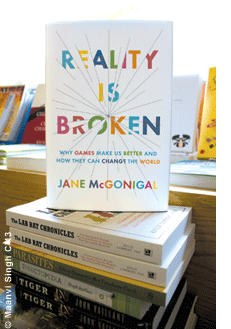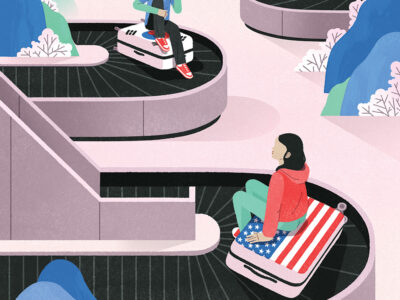
Incoming Penn freshmen who have been told all their lives to put away their video games and focus on school have finally been vindicated.
The upcoming year’s Penn Reading Project book, Reality is Broken, by Jane McGonigal, is subtitled Why Games Make Us Better and How They Can Change the World.
As McGonigal sees things, games can help solve almost any real-world problem. They can increase an individual’s happiness, confidence, and even their interpersonal skills. Heck, they can even help us cure cancer.
To back up these claims, McGonigal draws upon positive psychology, cognitive science, and sociology, as well as anecdotal evidence. A game designer herself, she specializes in creating games that challenge players to tackle societal problems such as hunger, poverty, and global warming.
McGonigal’s mission is to harness the power of 500 million gamers worldwide to solve such problems.
“What we liked about this book is it’s a research book that really looked seriously about how this affects our lives—and I think came to a very positive conclusion,” says David Fox, director of academic initiatives.
The book goes along with the Provost’s theme for the upcoming school year: the Year of Games.
The PRP book choice and theme year play up existing classes and research at Penn related to video games. For example, Kevin Werbach, associate professor of legal studies and business ethics at Wharton, plans to teach an MBA seminar in the fall about “gamification”—the application of video game techniques to address business and social problems.
His class is at the cutting edge of business theory. “The idea of gamification, even as a term, has only taken hold in the past couple of years,” he says. But everyone from Target to the US Army is using gamification to motivate employees, he says. Werbach plans to integrate game mechanics into his teaching.
Werbach is something of a gamer himself. “I mostly play World of Warcraft,” he says. “It’s a massive multi-player online game. I’ve dabbled in various other games here and there. So to many people here at Wharton, I’m an active game player. To the real gamers, I’m a casual guy.”
“There is a good deal of research that games have positive qualities,” Werbach says. He isn’t the only Penn professor to have taken note. Norm Badler, the professor of computer and information science who directs the Center for Human Modeling and Simulation and the Digital Media Design program, has also been researching the real-world applications of virtual reality.
As one of the theme year’s main events, Badler is planning to hold a daylong, interdisciplinary symposium about video games in January. He will bring together faculty from Engineering, but also Wharton, Annenberg, and the Graduate School of Education.
It sounds like serious stuff, but to Badler, the entire conference is just one big game—literally. One of the students under Badler’s wing is creating an audience participation game, which he will debut at the symposium.
As Badler explains the idea, “Basically it makes the audience into a game controller. They’ll be able to collectively play some game on screen.”
Those who still aren’t sold on the idea of video games shouldn’t feel left out. Video games are just one aspect of the theme, according to Fox. “We want people to be thinking about [the theme] in the broadest possible way,” he says. Each school and each student might have a different way of think about games, he suggests. Computer science students might fixate on video games, but pre-med students might think about sports medicine. History majors might take interest in the ancient Olympics, and math majors might think about game theory.
Theme year events will be inspired not only by video games but by old-fashioned ones as well. Highlights are to include a national Scrabble tournament, a fair on Locust Walk, and the grand opening of Penn Park.
And, says Fox, “We really want to involve the entire University community.” So expect more than the usual complement of fun and games during Homecoming Weekend. The folks in Alumni Relations are taking the theme year to heart too.
—Maanvi Singh C’13




